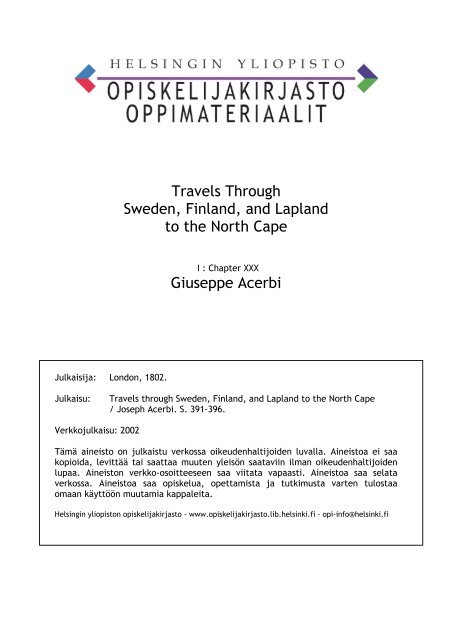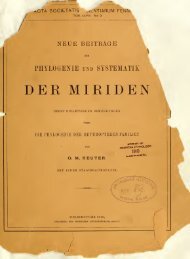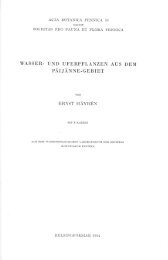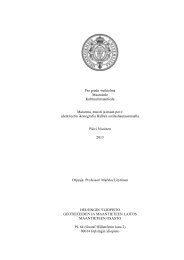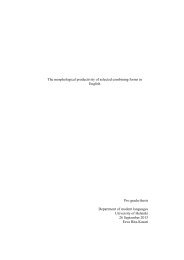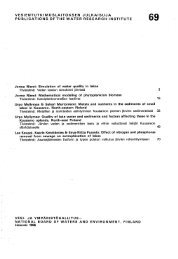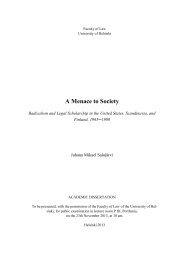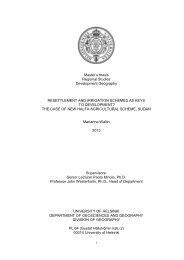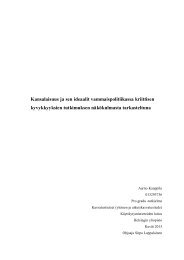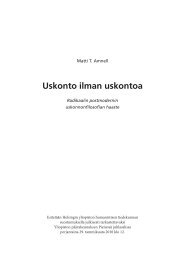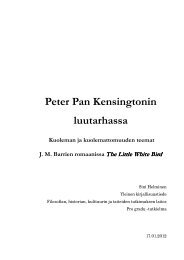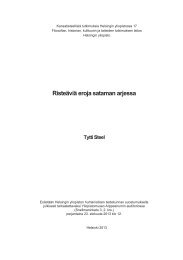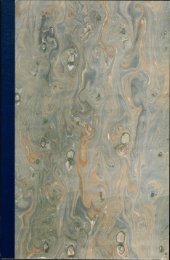Create successful ePaper yourself
Turn your PDF publications into a flip-book with our unique Google optimized e-Paper software.
Julkaisija: London, 1802.<br />
Travels Through<br />
Sweden, Finland, and Lapland<br />
to the North Cape<br />
I : Chapter <strong>XXX</strong><br />
Giuseppe Acerbi<br />
Julkaisu: Travels through Sweden, Finland, and Lapland to the North Cape<br />
/ Joseph Acerbi. S. 391-396.<br />
Verkkojulkaisu: 2002<br />
Tämä aineisto on julkaistu verkossa oikeudenhaltijoiden luvalla. Aineistoa ei saa<br />
kopioida, levittää tai saattaa muuten yleisön saataviin ilman oikeudenhaltijoiden<br />
lupaa. Aineiston verkko-osoitteeseen saa viitata vapaasti. Aineistoa saa selata<br />
verkossa. Aineistoa saa opiskelua, opettamista ja tutkimusta varten tulostaa<br />
omaan käyttöön muutamia kappaleita.<br />
Helsingin yliopiston opiskelijakirjasto - www.opiskelijakirjasto.lib.helsinki.<strong>fi</strong> - opi-info@helsinki.<strong>fi</strong>
<strong>CHAPTER</strong> <strong>XXX</strong>.<br />
Stay at Kengis - Entertainment given by the Inspector - The Bear - Dance a very fatiguing<br />
sort of Amusement - Visit from some young Women of the Neighbourhood ; among them<br />
one, a Native of Kollare, of a surprising Degree of bodily Strength - Separation of the<br />
Travellers - The Author and another Gentleman alone proceed Northward -Geographical<br />
Notice on the River Torneå.<br />
T<br />
HE inspector of the founderies at Kengis spared no expence that could contribute<br />
to render our stay at this place agreeable to us. He thought nothing in his house<br />
too costly for our entertainment: he assembled the peasants to shew us their<br />
dancing and the genius of their music; and on Sunday he treated our party with punch<br />
and liqueurs in a handsome little tent, which he had erected on a small eminence under<br />
his Italian poplars.<br />
Among the different dances exhibited by the peasants on this occasion, there was<br />
one which seemed particularly curious; it is called, in the language of the country, the<br />
bears´s-dance. A peasant rests his hands upon the ground, and at the same time<br />
supports himself on his legs, so as to keep his body in a horizontal position like the<br />
bear, or any other animal, when it walks on all fours. Remaining constantly in the same<br />
attitude, he begins to dance and by his leaps and jumps, studies to keep time with the<br />
music which is extremely gothic, and which the reader will <strong>fi</strong>nd inserted in the<br />
Appendix. The execution of this dance is attended with great labour and fatigue<br />
insomuch that it is very dif<strong>fi</strong>cult for the peasant to go on with it above three or four minutes,<br />
without falling into the most violent perspiration. It is however a sort of exercise<br />
which is good for strengthening the muscles of the arms, and therefore highly useful to<br />
the natives of this country, whose laborious exertions in ascending the cataracts in<br />
summer require very great vigour and muscular power. Address and bodily strength are<br />
the qualities in the highest repute among the peasantry in this part of Westrobothnia;<br />
and besides this dance, they have other exercises which demand a surprising degree of<br />
activity and <strong>fi</strong>rmness in their limbs.<br />
While we sat in our tent on the summit of the hill, a number of Finlandish girls,<br />
induced by curiosity to see us, surrounded the tent. We soon recommended ourselves to<br />
their acquaintance, and invited the handsomest of them to enter the tent; an invitation<br />
which they were not shy of accepting. We offered them wine but they disliked it; punch,<br />
but they had no greater relish for it: we ordered them beer, but they could as little drink<br />
this. At length we found out that those girls were accustomed to no other beverage than<br />
milk and water. There was among them a native of Kollare, who merited a more than<br />
ordinary share of our attention, and who immediately attracted our notice by her stature,<br />
her gaiety, and by a sharp and decided manner in her department. She had such<br />
strength of arms, that when we were disposed to toy with her, and seek perhaps to be a<br />
little too familiar, she would repulse us with a blow that forced us back four or <strong>fi</strong>ve<br />
paces. Her limbs were active and agile, she was remarkably tall, and in short would
have been a very <strong>fi</strong>ne woman, had not a long waist with very short petticoats,<br />
dis<strong>fi</strong>gured her person. Her face was not extremely delicate, but her features were well<br />
formed; her hair chesnut, her eyes lively, and her complexion full of health and<br />
vigour. She was dressed entirely in white of rather a <strong>fi</strong>ne linen cloth, which she had<br />
probably bought at Torneå of some travelling merchant: all her companions were<br />
perfectly clean, and every thing upon them was either new or recently washed.<br />
We spent about an hour in the company of these girls, all which time we kept<br />
constantly talking without understanding each other: we exchanged many heavy<br />
blows, enough to make one half serious; but this is a kind of affectionate caress<br />
among peasants in all parts of the world. The girl of Kollare was so strong and made<br />
such impression with her Herculean arm, that she had driven us to a man almost off<br />
the <strong>fi</strong>eld. Our interpreter hinted to us that we must take care how we offended this<br />
young woman, as she was to give us lodging at Kollare, a place we must pass on our<br />
route. She seemed pleased when she learned that we should be at her house next day,<br />
and promised that she would do every thing in her power to have her dwelling<br />
comfortable for us at our arrival.<br />
This day, which was Sunday, passed in mirth and festivity. The inspector, to shew<br />
the great amiability of his character gave us a Swedish song and a toast to each glass<br />
of punch, and it was in vain to decline <strong>fi</strong>lling a bumper. At midnight we quitted this<br />
tent to observe, on a more elevated ground, the height of the sun as usual; but on this<br />
occasion the company was by no means unanimous; not as to the sun's elevation<br />
alone, one person maintaining he saw two, and others, equally con<strong>fi</strong>dent and<br />
inebriated, that they saw no fewer than four. Instead however, of discussing the merits<br />
of the question with intemperate warmth, though held to be a matter of serious<br />
importance, we conducted ourselves with more prudence than the learned perhaps<br />
might have done on a subject of less magnitude; for we resolved to go to sleep and<br />
adjourn the subversion of the planetary system till the next morning. In short on the<br />
night following, at the same hour we were perfectly agreed both as to the height and<br />
number of suns.<br />
If Sunday had passed in all the pleasures of convivial enjoyment, Monday, the<br />
period <strong>fi</strong>xed for our departure, was so much the more wad and melancholy. Three of<br />
our friends took leave of us: Mr. Bellotti, Mr. Julin, and Dr. Deutsch would not, and<br />
indeed, for particular reasons could not, expose themselves to the dangers of our<br />
expedition, and chose to return to Torneå and Uleåborg. Our plan of travels received<br />
such a severe shock by their departure, as nothing but the most determined resolution<br />
could resist. Friendship and the infection of example made us hesitate for some time<br />
as to the propriety of persisting in our enterprise; but our pride could not digest the<br />
humiliating idea of returning to Uleåborg, to the great diversion of our friends, who<br />
would never have done rallying us on the subject or of boasting of their sage counsels,<br />
and the truth of their predictions. Colonel Skiöldebrand, with his servant, remained<br />
alone with me: his purpose continued unshaken for his ardour was not inferior to my<br />
own. He would not be discouraged by any dif<strong>fi</strong>culties in pursuing the object he had<br />
proposed to himself; and I was no less decided as to the execution of my project. I<br />
must confess that the idea of being the <strong>fi</strong>rst Italian that had ever reached the most<br />
northern point of Europe, was a very powerful incentive to my exertions.
Before quitting Kengis, I shall make a few geographical remarks on the river<br />
Torneå, and endeavour to give, in some degree, a clear idea of the nature and course<br />
of that river, concerning which there is much confusion and error in all the maps, and<br />
even in the Swedish accounts themselves.<br />
The river Tornea proceeds from a lake called Torneå Träsk, as its source. This lake is<br />
situated among the mountains which separate Norwegian from Swedish Lapland. From that<br />
lake the river also takes its name. It passes in its course near Kengis, where it forms two<br />
cataracts nearly forty feet high. It then approaches the town of Upper Torneå, twists round the<br />
little island of Swensar, on which the town of Torneå is situated, and last of all it makes the<br />
island of Björkön, on which stands the church of Lower Torneå. About a mile below Kengis,<br />
the waters of the riverreceive a considerable augmentation by their junction with another<br />
river, which has its source among a number of lakes and marshes higher up than Enontekis,<br />
and bears the name of Muonio, till it loses itself in its union with the Torneå. The latter,<br />
enriched by the Muonio, becomes of a very considerable size on its way to the sea, as it is<br />
still farther increased by the tributary streams of some rivulets which issue from the lakes and<br />
marshes in its vicinity, and at last it empties itself into the gulf of Bothnia.<br />
Near Kengis the banks of this river are considerably steeper than about Upper Torneå, and<br />
consist partly of a reddish feltspar and partly of slates of a blackish colour, whose angles<br />
stand edgeways with an inclination to the south.<br />
The river Torneå is in general subject to three inundations; namely, one in spring, caused<br />
by the dissolution of the ice and snow on the mountains; the second in summer, owing to<br />
sudden and violent falls of rain; and the third in autumn, before the setting in of the frost. The<br />
greatest breadth of this river, when its waters are of a mean height, is nine hundred, and its<br />
common breadth <strong>fi</strong>ve hundred yards: its greatest depth is ten yards, and its lowest shoal from<br />
two to <strong>fi</strong>ve feet. In winter it is frozen in its whole extent, and the thickness of the ice is<br />
from <strong>fi</strong>ve to some-times eight feet.<br />
END OF THE FIRST VOLUIIIE.<br />
T. Gillet, Printer, Salisbury-Square.


